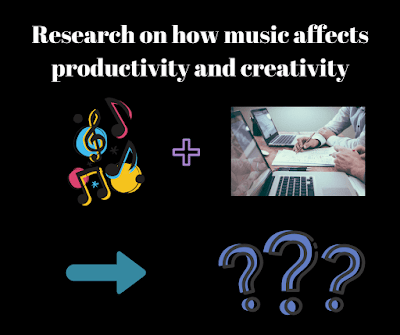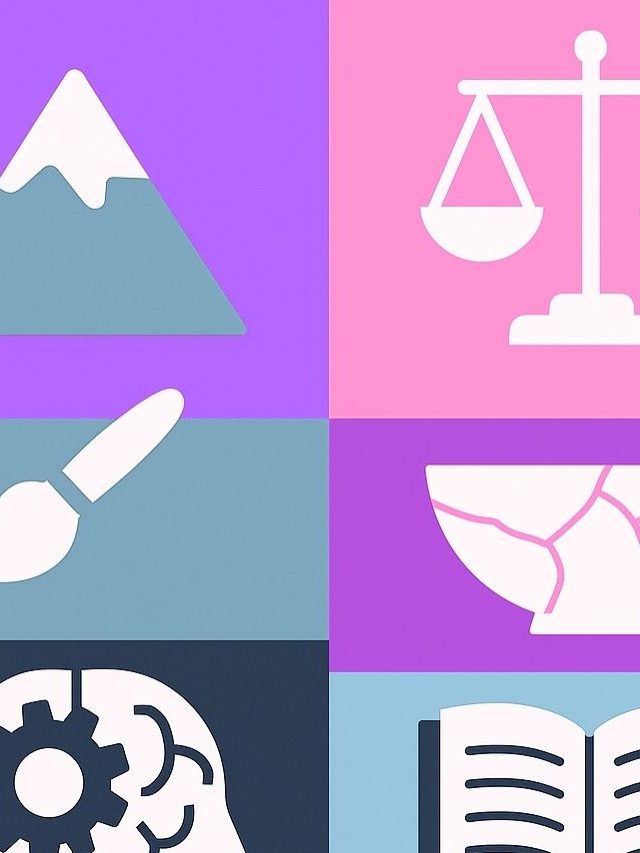Leaving all anecdotes aside, let us look at the scientific evidence. Considering the value of this question in our day-to-day lives, I’ll summarize music psychology research here.
Research has given us quite a few valuable insights into how music affects our minds and behavioral output. One example is Listening to slightly distracting music in the background, which makes you rethink your thoughts, could actually promote your creative thinking!
The truth is that people do listen to music while working or learning, so taking a philosophical approach isn’t helpful. The questions we need to ask are:
- Is this music detrimental to work?
- Is music a creativity booster?
- Is music good for learning & productivity?
- Are certain types of songs better for work?
- Is listening to music in the workplace a smart choice?
Let us find out.
-
The effect of background music on work quality, productivity, learning, and creativity
- 1. Music & creative design
- 2. Visual patterns & repetitive music
- 3. Attention, boredom, & self-chosen music
- 4. Background music & studying
- 5. Creativity, music, and noise
- 6. Classical music & classroom behavior
- 7. Arousing music & creativity
- 8. Work & music preference
- 9. Belief about music’s effect
- 10. Happy music, safety, and creativity
- Summary of research on the effect of music on work productivity & creativity
- Sources
The effect of background music on work quality, productivity, learning, and creativity
Here are 10 insights into the role of music in creativity & productivity. Each point summarizes one type of research conclusion.
Is music in the workplace a good idea? The following insights will help answer this question.
1. Music & creative design
Software workers, while working on software design, experienced better emotional states (affect), lesser time on task, and improved quality of work while listening to music[2]. Quality of work here was defined as creativity in design. The workers had the liberty to choose any music they like and listen to it whenever they wanted to.
2. Visual patterns & repetitive music
One experiment[3] showed that visual cognition (identification & processing of Arabic symbols) was better with background music, but the accuracy lowered once the music became repetitive. Correct visual recognition was better in a sensory-rich environment (rock & classical music). It seems that novelty in sound is important; and by extension, sensory stimulation may be more significant than the actual ‘musical’ quality.
3. Attention, boredom, & self-chosen music
Surgeons who chose their own preferred music[4] were physiologically more composed & had higher task accuracy on a non-surgical stressful task. Listening to music provided by experimenters was less favorable but still better than no background music. One explanation for this is that music counters stress and occupies attention to reduce overthinking or fixating on potential errors. Most tasks at work are low-effort tasks that do not require too much complex thinking or attention for long durations. For example – typing, cleaning, coding, sorting, etc., are all habit-based activities that demand high concentration only in short bursts. For such low-demand activities[5], a study showed that preferred background music enhanced periods of high concentration by reducing mind-wandering, ultimately increasing total productivity. One reason is that low-demand tasks (or boring/habit-based tasks) are not stimulating enough to sustain attention, so music increases arousal to improve task performance.
4. Background music & studying
One study[6] found no overall difference between studying with or without music. But between types of music, rap & hip hop negatively affected GPA, and classical & easy listening positively affected GPA. This is consistent with the idea that vocal content in music is a distractor due to its natural attention-grabbing nature. We are more reactive to vocal sounds than non-vocal sounds. Vocals in a language you don’t understand might function like another instrument and reduce the distracting power of vocals.
This is why I like kpop while working, I don’t get a word, but the few English words in them generally increase momentary enjoyment. This helps me focus for longer by restoring my attention.
Related: Learn How to Increase Concentration and Focus while Studying and Working [Scientific Tips]
5. Creativity, music, and noise
A study[7] on ambient noise and creativity showed that 50 to 70 decibels of ambient noise improved performance on creative tasks. High noise (85 dB) hurt creativity. Further investigations showed that moderate ambient noise made information processing difficult, which in turn promoted abstract reasoning changing construal levels[8]. Construal level (CL) is the psychological distance between information and your thought. If something obscures information, makes it less tangible, or less cohesive, CL could increase. The higher
Note: abstract thinking is closely associated with creativity. Noise generally hampers[9] learning and productivity, especially when the learners are at a disadvantage, such as language difficulties. However, what counts as noise is highly subjective. One man’s music is another man’s noise.
6. Classical music & classroom behavior
An unpublished thesis[10] studied the behavior and motivation of 4th-grade students and found that background music improved their behavior, on-task time, learning, and motivation. They used classical music to improve the global classroom environment & student engagement.
7. Arousing music & creativity
Yet another study[11] found that background music (classical music high on arousal and positive mood) promoted divergent thinking but did not find any effect on convergent thinking. Divergent thinking is about taking diverging trains of thought to land on multiple solutions to a problem. This is characteristic of innovation and creative work. Convergent thought is more like logically working toward a single solution.
8. Work & music preference
While playing background music at work, a not-so-conclusive study showed that the intensity of liking or disliking[12] music negatively affected attention. Loving the music or hating it increased the negative impact. Neutral music affected attention the least. In another study[13], researchers tested the effect of self-chosen music vs. no music on reading comprehension. Not surprisingly, the researchers found that those who listened to self-chosen music performed just as well as those who did not listen to any background music.
9. Belief about music’s effect
Music can benefit attention[14] while working based on realistic assumptions about how music affects one’s own productivity. People who believe music helps have better performance. Those who thought it distracted them ended up being distracted by music. One way to interpret the study is by thinking people have accurate assumptions about how music affects them. Another way to interpret these results is by looking at how beliefs manifest into reality. The confirmation bias could warp our perception to notice only those times when our pre-conceived notions about the effect of music on work is confirmed and ignore those times it didn’t confirm. Or the self-fulfilling prophecy could make us act in ways that make our beliefs come true. i.e., believing music hurts productivity leads to lower effort or sabotage in performance to prove one’s belief.
Related: Losing focus? Try distractions, multitasking, music, & breaks
10. Happy music, safety, and creativity
One study[15] shows that employees who listen to music that makes them happy tend to be more creative at work because they feel a sense of psychological safety – feeling secure, comforted, familiar, and in control. Feeling safe at work is generally a positive thing. Music can add to that feeling by offering positive emotions, a distraction from other possible concerns, and an auditory environment that you like making you more comfortable. Another reason why feeling good through music that brings joy is a good idea for work is that positive emotions tend to broaden a person’s cognitive horizon. The broaden and build theory[16] says positive emotions liquidate more novel thoughts, useful actions, new perspectives, and attention to missed details, and this further improves social and skill performance. When this chain of positive emotions and enhanced cognitive function continues, learning is more likely to be efficient and lead to fulfillment.
This concludes a quick overview of research to know if listening to music during work is good or bad for productivity.
You can extrapolate these findings to make a judgment call.
So does music make you productive? Yes. We see that listening to music in the background does benefit creativity & productivity, but there are limitations to this.
Summary of research on the effect of music on work productivity & creativity
- Procedural tasks such as movements & protocols you are used to doing benefit from background music.
- Music can relieve boredom if the tasks are too easy or repetitive
- Preferred or liked music usually improves productivity.
- Attention-demanding task performance can worsen by music, especially vocal music.
- Not-so-loud music of your choice can help with creative work.
- Work time musical routines for a large group of people should ideally be neutral (no extreme likes or dislikes).
- Noise is generally bad, and some styles of music could be noisy to some but not others.
Overall, there is no direct answer to the question. But using these insights and then answering…
- Who is working?
- How intensely do you need to work or focus?
- Do you need long-sustained hours or a few minutes of hyper-focus at a time?
- What activity are you doing? Is it mundane? Is it attention-demanding? Is creativity important? Is instruction important?
- Is the environment loaded with interpersonal interaction?
… could produce a tangible answer to the question we are looking at. If you need help in using this research to understand whether music is good for you or your office environment, leave a comment. I’ll help you decide.
Book recommendation
Beethoven’s Anvil is one of the best books I’ve read when it comes to the role of music in the human condition. It is full of research findings, conjectures, and hypotheses. The author examines music from multiple aspects (social, cultural, cognitive, physiological, metaphysical, etc.) In fact, he introduces a new word: Musiking, the human condition of involving oneself with music. I wholeheartedly recommend reading this book. Click to buy it.
The link below is an affiliate link. That means I earn a commission for selling the book at NO additional cost to you.
Beethoven’s Anvil[17]
P.S. I listened to music (overwerk[18]) while composing this post. Is it creative? No. Is it productive? Perhaps. Did I feel I was productive in answering? Yes.
Sources
[2]: https://journals.sagepub.com/doi/abs/10.1177/0305735605050650
[3]: https://pubmed.ncbi.nlm.nih.gov/10432509/
[4]: https://jamanetwork.com/journals/jama/article-abstract/379309
[5]: https://link.springer.com/article/10.1007/s00426-020-01400-6
[6]: https://digitalcommons.liberty.edu/honors/154/
[7]: https://www.jstor.org/stable/10.1086/665048?seq=1#page_scan_tab_contents
[8]: https://www.ncbi.nlm.nih.gov/pmc/articles/PMC3152826/
[9]: https://www.ncbi.nlm.nih.gov/pmc/articles/PMC3757288/
[10]: https://files.eric.ed.gov/fulltext/ED522618.pdf
[11]: https://journals.plos.org/plosone/article?id=10.1371%2Fjournal.pone.0182210
[12]: https://www.gwern.net/docs/music-distraction/2011-huang.pdf
[13]: https://dl.acm.org/doi/abs/10.1145/3383583.3398543
[14]: https://diginole.lib.fsu.edu/islandora/object/fsu:183125
[15]: https://www.ingentaconnect.com/content/sbp/sbp/2022/00000050/00000004/art00010
[16]: https://www.ncbi.nlm.nih.gov/pmc/articles/PMC1693418/
[17]: https://amzn.to/3FXvYYS
[18]: https://www.youtube.com/watch?v=yTmRxuXwivs

Hey! Thank you for reading; hope you enjoyed the article. I run Cognition Today to capture some of the most fascinating mechanisms that guide our lives. My content here is referenced and featured in NY Times, Forbes, CNET, and Entrepreneur, and many other books & research papers.
I’m am a psychology SME consultant in EdTech with a focus on AI cognition and Behavioral Engineering. I’m affiliated to myelin, an EdTech company in India as well.
I’ve studied at NIMHANS Bangalore (positive psychology), Savitribai Phule Pune University (clinical psychology), Fergusson College (BA psych), and affiliated with IIM Ahmedabad (marketing psychology). I’m currently studying Korean at Seoul National University.
I’m based in Pune, India but living in Seoul, S. Korea. Love Sci-fi, horror media; Love rock, metal, synthwave, and K-pop music; can’t whistle; can play 2 guitars at a time.
 [1]
[1]



























Usually Blogs lack depth for serious learning. They are good for intellectual entertainment (in a good sense), announcements (again in good sense — for example announcing some new ideas, new articles, new products), “general interests” reading. Not the case with your post though, really enjoyed it reading it and it held my attention all the way through!
Looks like I don’t have to worry about music while working haha